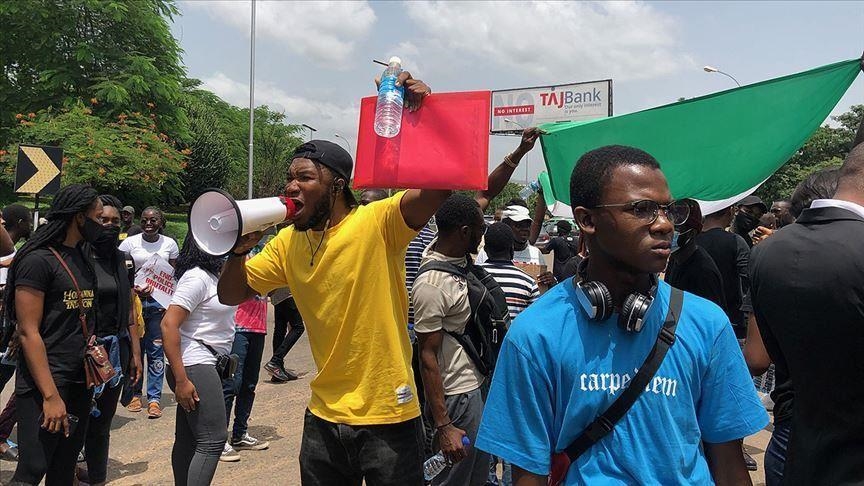Strictly Personal
Do protests work around here? For all seems stuck in ‘history’, By Elsie Eyakuze
Published
1 year agoon

French President Emmanuel Macron was recently caught having a rather lovely Marie Antionette moment. During a press conference, he remembered that the luxury watch he was wearing might be ill-received by the audience he was trying to convince that the economy would best be served by their working longer.
n the glory of the Champs Elysees of Paris a city strewn with garbage, this tiny act of awareness was historically delicious. The French are in revolt, a few hundred years after beheading their last king. Practice makes perfect?
So, when Kenyans also decided to take to the streets I promise I tried to be surprised. Maybe even believe in the cause, the idea that mass action would work to give the people economic ease. Kenya is the most muscular economy in the region — the centre that must hold if any of the incremental changes we need to make the dream of a viable expansion of East Africa possible. And yet, with every regime, the schisms are harder to hide. And rather than an inch towards the miseries of consensus and sacrifice for the greater good, well…
Faith in ‘history’
I lost my faith in “history” a while back. Not history as a subject, more like the framing of the relations of power. The endless list of why things are the way they are now. And, perhaps most of all, the stalemate we find ourselves in.
Another day, another protest. But we’re not supposed to say that. In the media we must reduce deep, yet petty, conflicts and their consequences to “clashes of elephants, where the grass suffers” then indulge the he-said-she-said format. We must forget that histories simply pile up on each other until they are habit.
When challenged by the inspired, especially online, about why Tanzanians have never had the coconuts to get out and demand the change they want, it is politic to smile and deflect. Perhaps obfuscate, amuse but never admit that, indeed, we’re captive.
When Abdulrazak Gurnah won the Nobel Prize for literature, an appreciable number of people were shocked to learn he had to leave Zanzibar in his youth because it was not the picturesque isle of beachfront property development and evening seafood broils it presents now.
Promise of change
Ah, vive la revolution, yes? Especially if we perform our roles: The rulers with rules and us with our little protests, and the promise of change that keeps us all going. We are not supposed to say: “Hey, this form of democracy sucks! Why is it so formulaic and predictable? And where, truly, is the glory in marching?”
Why don’t the constant marches truly result in adequate bread, shoes for the children, clean water and cheap energy, a life of safety for women — a break in the cycles? It is hard to have answers to a glimpse of something you see out the corner of your eye, but I am assured that humanity has never been more prosperous as a global community. I believe it. There is a handful of white men going to space for fun while malnutrition stalks many others.
What wonders modernity holds for us! What I know is that short of not bothering with amassing in the streets, protest has seemed the lexicon of the moment, at least until we figure out how to effect real change. So see you at the next one. I am sure that is the one that will work.
Elsie Eyakuze is an independent consultant and blogger for The Mikocheni Report; Email
You may like
-


Air Peace, capitalism and national interest, By Dakuku Peterside
-


This is chaos, not governance, and we must stop it, By Tee Ngugi
-


Off we go again with public shows, humbug and clowning, By Jenerali Uliwengu
-


How patriarchy underpins gender violence today, By Tee Ngugi
-


Help! There’s a dangerous, secret plot to save the EAC from imminent death, By Charles Onyango-Obbo
-


South African women of Jewish descent stage protest against Hamas
Strictly Personal
Air Peace, capitalism and national interest, By Dakuku Peterside
Published
4 days agoon
April 16, 2024
Nigerian corporate influence and that of the West continue to collide. The rationale is straightforward: whereas corporate activity in Europe and America is part of their larger local and foreign policy engagement, privately owned enterprises in Nigeria or commercial interests are not part of Nigeria’s foreign policy ecosystem, neither is there a strong culture of government support for privately owned enterprises’ expansion locally and internationally.
The relationship between Nigerian businesses and foreign policy is important to the national interest. When backing domestic Nigerian companies to compete on a worldwide scale, the government should see it as a lever to drive foreign policy, and national strategic interest, promote trade, enhance national security considerations, and minimize distortion in the domestic market as the foreign airlines were doing, boost GDP, create employment opportunities, and optimize corporate returns for the firms.
Admitted nations do not always interfere directly in their companies’ business and commercial dealings, and there are always exceptions. I can cite two areas of exception: military sales by companies because of their strategic implications and are, therefore, part of foreign and diplomatic policy and processes. The second is where the products or routes of a company have implications for foreign policy. Air Peace falls into the second category in the Lagos – London route.
Two events demonstrate an emerging trend that, if not checked, will disincentivize Nigerian firms from competing in the global marketplace. There are other notable examples, but I am using these two examples because they are very recent and ongoing, and they are typological representations of the need for Nigerian government backing and support for local companies that are playing in a very competitive international market dominated by big foreign companies whose governments are using all forms of foreign policies and diplomacy to support and sustain.
The first is Air Peace. It is the only Nigerian-owned aviation company playing globally and checkmating the dominance of foreign airlines. The most recent advance is the commencement of flights on the Lagos – London route. In Nigeria, foreign airlines are well-established and accustomed to a lack of rivalry, yet a free-market economy depends on the existence of competition. Nigeria has significantly larger airline profits per passenger than other comparable African nations. Insufficient competition has resulted in high ticket costs and poor service quality. It is precisely this jinx that Air Peace is attempting to break.
On March 30, 2024, Air Peace reciprocated the lopsided Bilateral Air Service Agreement, BASA, between Nigeria and the United Kingdom when the local airline began direct flight operations from Lagos to Gatwick Airport in London. This elicited several reactions from foreign airlines backed by their various sovereigns because of their strategic interest. A critical response is the commencement of a price war. Before the Air Peace entry, the price of international flight tickets on the Lagos-London route had soared to as much as N3.5 million for the economy ticket. However, after Air Peace introduced a return economy class ticket priced at N1.2 million, foreign carriers like British Airways, Virgin Atlantic, and Qatar Airways reduced their fares significantly to remain competitive.
In a price war, there is little the government can do. In an open-market competitive situation such as this, our government must not act in a manner that suggests it is antagonistic to foreign players and competitors. There must be an appearance of a level playing field. However, government owes Air Peace protection against foreign competitors backed by their home governments. This is in the overall interest of the Nigerian consumer of goods and services. Competition history in the airspace works where the Consumer Protection Authority in the host country is active. This is almost absent in Nigeria and it is a reason why foreign airlines have been arbitrary in pricing their tickets. Nigerian consumers are often at the mercy of these foreign firms who lack any vista of patriotism and are more inclined to protect the national interest of their governments and countries.
It would not be too much to expect Nigerian companies playing globally to benefit from the protection of the Nigerian government to limit influence peddling by foreign-owned companies. The success of Air Peace should enable a more competitive and sustainable market, allowing domestic players to grow their network and propel Nigeria to the forefront of international aviation.
The second is Proforce, a Nigerian-owned military hardware manufacturing firm active in Rwanda, Chad, Mali, Ghana, Niger, Burkina Faso, and South Sudan. Despite the growing capacity of Proforce in military hardware manufacturing, Nigeria entered two lopsided arrangements with two UAE firms to supply military equipment worth billions of dollars , respectively. Both deals are backed by the UAE government but executed by UAE firms.
These deals on a more extensive web are not unconnected with UAE’s national strategic interest. In pursuit of its strategic national interest, India is pushing Indian firms to supply military equipment to Nigeria. The Nigerian defence equipment market has seen weaker indigenous competitors driven out due to the combination of local manufacturers’ lack of competitive capacity and government patronage of Asian, European, and US firms in the defence equipment manufacturing sector. This is a misnomer and needs to be corrected.
Not only should our government be the primary customer of this firm if its products meet international standards, but it should also support and protect it from the harsh competitive realities of a challenging but strategic market directly linked to our national military procurement ecosystem. The ability to produce military hardware locally is significant to our defence strategy.
This firm and similar companies playing in this strategic defence area must be considered strategic and have a considerable place in Nigeria’s foreign policy calculations. Protecting Nigeria’s interests is the primary reason for our engagement in global diplomacy. The government must deliberately balance national interest with capacity and competence in military hardware purchases. It will not be too much to ask these foreign firms to partner with local companies so we can embed the technology transfer advantages.
Our government must create an environment that enables our local companies to compete globally and ply their trades in various countries. It should be part of the government’s overall economic, strategic growth agenda to identify areas or sectors in which Nigerian companies have a competitive advantage, especially in the sub-region and across Africa and support the companies in these sectors to advance and grow to dominate in the African region with a view to competing globally. Government support in the form of incentives such as competitive grants ,tax credit for consumers ,low-interest capital, patronage, G2G business, operational support, and diplomatic lobbying, amongst others, will alter the competitive landscape. Governments and key government agencies in the west retain the services of lobbying firms in pursuit of its strategic interest.
Nigerian firms’ competitiveness on a global scale can only be enhanced by the support of the Nigerian government. Foreign policy interests should be a key driver of Nigerian trade agreements. How does the Nigerian government support private companies to grow and compete globally? Is it intentionally mapping out growth areas and creating opportunities for Nigerian firms to maximize their potential? Is the government at the domestic level removing bottlenecks and impediments to private company growth, allowing a level playing field for these companies to compete with international companies?
Why is the government patronising foreign firms against local firms if their products are of similar value? Why are Nigerian consumers left to the hands of international companies in some sectors without the government actively supporting the growth of local firms to compete in those sectors? These questions merit honest answers. Nigerian national interest must be the driving factor for our foreign policies, which must cover the private sector, just as is the case with most developed countries. The new global capitalism is not a product of accident or chance; the government has choreographed and shaped it by using foreign policies to support and protect local firms competing globally. Nigeria must learn to do the same to build a strong economy with more jobs.
Strictly Personal
This is chaos, not governance, and we must stop it, By Tee Ngugi
Published
1 week agoon
April 10, 2024
The following are stories that have dominated mainstream media in recent times. Fake fertiliser and attempts by powerful politicians to kill the story. A nation of bribes, government ministries and corporations where the vice is so routine that it has the semblance of policy. Irregular spending of billions in Nairobi County.
Billions are spent in all countries on domestic and foreign travel. Grabbing of land belonging to state corporations, was a scam reminiscent of the Kanu era when even public toilets would be grabbed. Crisis in the health and education sectors.
Tribalism in hiring for state jobs. Return of construction in riparian lands and natural waterways. Relocation of major businesses because of high cost of power and heavy taxation. A tax regime that is so punitive, it squeezes life out of small businesses. Etc, ad nauseam.
To be fair, these stories of thievery, mismanagement, negligence, incompetence and greed have been present in all administrations since independence.
However, instead of the cynically-named “mama mboga” government reversing this gradual slide towards state failure, it is fuelling it.
Alternately, it’s campaigning for 2027 or gallivanting all over the world, evoking the legend of Emperor Nero playing the violin as Rome burned.
A government is run based on strict adherence to policies and laws. It appoints the most competent personnel, irrespective of tribe, to run efficient departments which have clear-cut goals.
It aligns education to its national vision. Its strategies to achieve food security should be driven by the best brains and guided by innovative policies. It enacts policies that attract investment and incentivize building of businesses. It treats any kind of thievery or negligence as sabotage.
Government is not a political party. Government officials should have nothing to do with political party matters. They should be so engaged in their government duties that they literally would not have time for party issues. Government jobs should not be used to reward girlfriends and cronies.
Government is exhausting work undertaken because of a passion to transform lives, not for the trappings of power. Government is not endless campaigning to win the next election. To his credit, Mwai Kibaki left party matters alone until he had to run for re-election.
We have corrupted the meaning of government. We have parliamentarians beholden to their tribes, not to ideas.
We have incompetent and corrupt judges. We have a civil service where you bribe to be served. Police take bribes to allow death traps on our roads. We have urban planners who plan nothing except how to line their pockets. We have regulatory agencies that regulate nothing, including the intake of their fat stomachs.
We have advisers who advise on which tenders should go to whom. There is no central organising ethos at the heart of government. There is no sense of national purpose. We have flurries of national activities, policies, legislation, appointments which don’t lead to meaningful growth. We just run on the same spot.
Tee Ngugi is a Nairobi-based political commentator
EDITOR’S PICK


Africa’s largest tech hub AfriLabs welcomes 16 new additions
The largest network technology hub in Africa, AfriLabs, has announced the admission of 16 new hubs into its fold, thereby...


Wife of Zambian music star Yo Maps sues businessman over alleged cyberbullying
The wife of Zambian music sensation, Elton Mulenga, popularly known as Yo Maps, Kidist Kifle, has sued a Lusaka-based businessman...


IMF gives reasons why it advised Nigeria to remove fuel subsidy
The International Monetary Fund (IMF) has given reasons why it advised Nigeria to end the fuel subsidy regime which it...


Nigerian Chess master Tunde Onakoya sets 58-hour new chess-a-thon record, pushes for 60 hours
Nigerian chess master, Tunde Onakoya, on Saturday, achieved his dream of setting a new Guinness World Record for the longest...


Survey ranks Egypt, Ethiopia, Morocco, South Africa among 15 ‘cheap countries’ for family trips
A recent survey carried out by Insider Monkey, an investment website that tracks corporate insiders and hedge funds, has ranked...


Nigerians drum support for chess master Tunde Onakoya as he attempts to break world record
Nigerians from all walks of life, including politicians, captains of industry and celebrities, have drummed up support for chess master,...


SA internet service provider Kaya Konekta launches data access for underserved communities
South Africa’s leading Internet Service Provider (ISP), Kaya Konekta (KaKo), has launched new operations aimed at reaching underserved communities in...


Zambian opposition party decries rise in tribalism, corruption, calls for national dialogue
One of Zambia’s main opposition party, the Socialist Party (SP), has decried what it calls the rising tribalism, repression and...


‘Reconsider your anti-people policies, they are causing hardship, insecurity in Nigeria’— PDP tells Tinubu
Nigeria’s main opposition party, the Peoples Democratic Party (PDP), has called on President Bola Tinubu to consider what it calls...


Top European, Asian clubs on alert as Super Eagles keeper set to make contract decision
Some top clubs in Europe and Asia have been put on alert as Super Eagles and Chippa United goalkeeper, Stanley...
Trending
-

 Tech2 days ago
Tech2 days agoNigeria’s MAX partners Ghana’s Kofa in e-bike financing deal
-

 Sports2 days ago
Sports2 days agoTop European, Asian clubs on alert as Super Eagles keeper set to make contract decision
-

 Metro1 day ago
Metro1 day ago‘Reconsider your anti-people policies, they are causing hardship, insecurity in Nigeria’— PDP tells Tinubu
-

 Metro2 days ago
Metro2 days agoZambia asks EU to help strengthen its democratic initiatives ahead of 2026 elections


